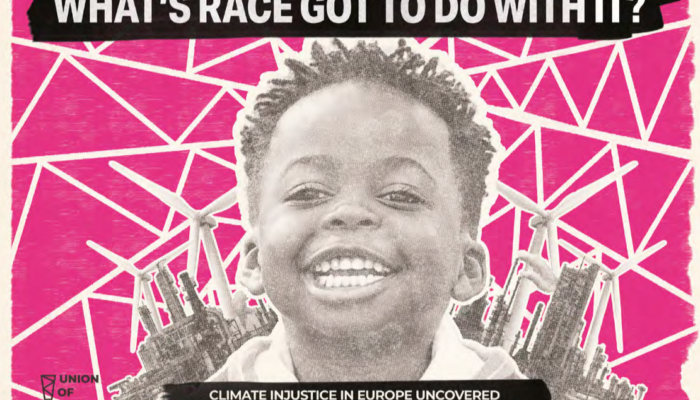
I have had the opportunity last year to contribute to a novel, ground breaking research conducted by the Union of Justice, a European, independent, people of colour (POC) led organisation dedicated to racial justice and climate justice. The full report is live now and I am writing this blog post about it because I strongly believe that it is a must-read for anybody who would even wonder why racism should be part of the climate justice conversation. The report unpacks why climate justice can never be achieved without continuing to unwrap the racialised injustices that most often shape the lived experiences of non-white communities across Europe. The report is based on the data collected through roundtable discussions, interviews with scholars, residents, and activists of colour across ten Western European countries, along with an online survey. The result is an outstanding study that stands as one of the rare comprehensive, comparative analyses linking climate change to systemic racialised issues in Europe.
The report structure in a nutshell:
In recent years, the discourse around climate change has gained widespread attention, especially in Europe, where governments and environmental movements have been at the forefront of pushing for climate action. However, a critical issue has been largely overlooked in this discussion: the role and experiences of racialised communities. This is where The Union of Justice stepped up with their report, a research project that explores the intersection of climate policy, social policy, and racialised matters in Europe, and focuses on how racism increases environmental harms for racialised populations and how a lack of social resources hinders their influence on climate policy. Environmental injustice in Europe extends beyond exposure to environmental harms, to include unequal access to resources that address these harms. While climate racism has been extensively studied in the United States, growing research in Europe highlights that marginalised racialised communities are disproportionately affected by pollution, industrial waste, and poor air quality. These populations also face political exclusion that limits their ability to influence local policy decisions.
From November to December 2023, roundtable discussions across ten countries revealed dissatisfaction with climate policies, especially concerning housing, which left racialised communities more vulnerable to environmental hazards.
Roundtable discussions: Insights into local realities
Between November and December 2023, a series of roundtable discussions were held with individuals from various countries in Europe to contextualise the research. These discussions, conducted in countries like France, Germany, Italy, Ireland, and Spain, focused on three key areas: the lived realities of racialised communities in relation to environmental harms, the approach to climate policies in each country, and the capacity of racialised communities to influence these policies.
1. Context of racialised populations. The roundtables revealed that racialised communities often face greater exposure to environmental hazards, such as heat islands, industrial pollution, and substandard housing conditions. This segregation was particularly visible in urban spaces, where racialised populations are concentrated in areas prone to environmental degradation. For example, in France, Roma communities are frequently housed near toxic land, while in Germany, racialised groups often live in poorly maintained buildings near industrial zones.
2. Climate policies: colour-blind or racially-conscious? Participants also discussed whether national climate policies in their countries addressed the specific needs of racialised communities. Unfortunately, most respondents felt that these policies were ‘race-blind,’ failing to consider how existing racial disparities worsen environmental vulnerability. Few believed that their governments had made meaningful efforts to bridge this gap, with some even pointing to policies that exacerbated social and environmental inequalities.
3. Space for shaping policy. A critical theme that emerged was the lack of political space for racialised communities to participate in policymaking processes. Active disenfranchisement, coupled with social exclusion and institutional racism, kept these groups out of vital discussions. For instance, Austria’s restrictive citizenship process was highlighted as a barrier to political participation for migrant communities, further marginalising their voices in climate policy development.
Themes: Housing, exclusion, and environmental harms
The roundtable discussions unearthed several recurring themes that cross national boundaries. The issue of housing, in particular, stood out as a frontline for climate justice struggles in Europe. In almost every country studied, participants pointed to how racialised communities are segregated into areas disproportionately exposed to environmental hazards—whether it be due to industrial pollution, lack of green spaces, or inadequate infrastructure.
1. Habitation and environmental hazards: In cities across Europe, racialised communities often find themselves living in neglected areas, subject to higher exposure to pollutants from nearby industrial zones or incinerators. The lack of green spaces in these areas further compounds the problem, limiting their ability to mitigate the impacts of climate change, such as rising temperatures and air pollution. For example, respondents in Spain and Italy pointed to neighborhoods where immigrant communities lived in substandard housing with minimal access to clean air or green environments.
2. Political exclusion: The exclusion of racialised groups from political processes was another significant concern. In many countries, local governments failed to enforce housing and environmental regulations in racialised communities, leaving these populations vulnerable to exploitation and neglect. The marginalisation of these groups was often compounded by rising political polarisation, with far-right parties gaining traction across Europe. In several countries, far-right movements not only denied climate change but actively advocated for policies that further marginalised racialised communities, creating a hostile environment for climate justice advocacy.
3. A growing divide between climate and social justice: One of the most disturbing findings from the roundtables was the growing disconnect between climate action and social justice. Mainstream climate politics are focused on environmental concerns alone, and therefore tend to overlook the social inequalities that aggravate the climate crisis for marginalised communities. This narrow approach has allowed far-right parties to position themselves as ‘pro-climate’ while ignoring the social justice dimension of the climate crisis. This has contributed to a broader political quagmire in Europe, as seen in the declining legitimacy of initiatives like the European Green Deal.
Survey findings:
In addition to the roundtable discussions, a survey was conducted to further explore how racialised communities perceive climate change and their governments’ climate action. The survey addressed three main areas: the importance of climate change as a national issue, satisfaction with government communication on climate plans, and perceived barriers to engaging with climate policy.
1. The importance of climate change: The survey revealed that the vast majority of racialised respondents—over 75% in most countries—consider climate change to be an important national issue. This aligns with general European polling on the climate crisis, indicating that racialised communities, like the wider population, are deeply concerned about the environment. However, in countries like Italy and Spain, there was a notable disconnect, with around 25-30% of respondents viewing climate change as less important, possibly due to other more immediate social and economic concerns.
2. Community relevance: When asked how important climate change was for their specific communities, the responses were similarly high. Most racialised respondents saw climate change as a direct threat to their well-being, particularly given the environmental hazards and poor living conditions in their neighborhoods. This highlights that climate change is not just a global issue for these communities; it is a personal and immediate challenge.
3. Barriers to engagement: Despite their concerns, most respondents reported feeling excluded from shaping climate policy. This exclusion was largely attributed to systemic racism, political disenfranchisement, and the lack of channels for marginalised communities to influence decision-making. Many respondents expressed frustration with their governments’ failure to communicate climate action plans effectively or involve marginalised communities in these discussions.
Recommendations for climate justice
The findings from the roundtable discussions and surveys paint a bleak picture of the reality for racialised communities within Europe’s climate justice landscape. However, there are numerous actionable steps that both the European Union and national governments can take to address these issues and promote inclusive, equitable climate action. While the following diagram I made highlights a few key recommendations, the full report offers a more extensive range of solutions across three levels: the European Union, national governments, and civic engagement, along with other organizations.
Final reflections:
The exclusion of racialised communities from climate policymaking in Europe is not just a climate issue; it is a matter of justice and democracy. The findings from this research show that while racialised populations are deeply concerned about the climate crisis, they are largely excluded from shaping the policies meant to address it. This disenfranchisement has far-reaching consequences, not only for environmental justice but for the health of European democracy itself.
To move forward, climate movements, governments, and the European Union must take bold steps to center the voices of marginalised communities in climate action. Integrating social justice into climate policy is Europe’s only effective and just path towards ensuring a more inclusive, equitable, and effective response to the climate crisis—one that benefits all communities, not just the privileged few.
Disclaimer regarding my use, as well as the report’s use, of the term “race/racialised”: Recognising that there is no universally agreed-upon term across Europe, both this blog and the report use the terms ‘racialised’ and ‘racialised communities.’ The term ‘racialised’ is used to highlight that ‘race’ is not a natural, stable, or scientific category, but rather a construct shaped by social and political forces.





